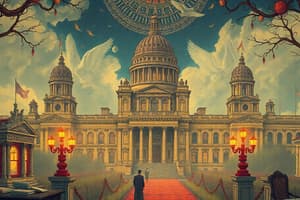Podcast
Questions and Answers
What primary emotion does the author associate with their literary ambitions?
What primary emotion does the author associate with their literary ambitions?
- Isolation and undervalued feeling (correct)
- Pride in achievements
- Fear of failure
- Joy and happiness
How much serious writing does the author claim to have produced during their childhood and boyhood?
How much serious writing does the author claim to have produced during their childhood and boyhood?
- The majority of their time
- Only half a dozen pages (correct)
- Several books worth
- About a hundred pages
What form of writing did the author attempt at the age of eleven?
What form of writing did the author attempt at the age of eleven?
- A science fiction story
- A novel
- A poem about the war (correct)
- A short play
Which type of poem did the author primarily produce as a teenager?
Which type of poem did the author primarily produce as a teenager?
What peculiar phrase does the author recall from their first poem about a tiger?
What peculiar phrase does the author recall from their first poem about a tiger?
What kind of literary work did the author help create and edit during their youth?
What kind of literary work did the author help create and edit during their youth?
What literary activity does the author describe as being made-to-order and lacking personal enjoyment?
What literary activity does the author describe as being made-to-order and lacking personal enjoyment?
What kind of literary exercise did the author engage in for over fifteen years?
What kind of literary exercise did the author engage in for over fifteen years?
What type of stories did the author initially imagine himself in as a child?
What type of stories did the author initially imagine himself in as a child?
At what age did the author feel compelled to describe what he was doing and seeing?
At what age did the author feel compelled to describe what he was doing and seeing?
What change occurred in the author's writing interest at the age of sixteen?
What change occurred in the author's writing interest at the age of sixteen?
What literary style did the author aspire to emulate in his early works?
What literary style did the author aspire to emulate in his early works?
Which of the following elements did the author want to include in his writing?
Which of the following elements did the author want to include in his writing?
What was the title of the author's first completed novel?
What was the title of the author's first completed novel?
How did the author view the influence of other writers on his descriptive efforts?
How did the author view the influence of other writers on his descriptive efforts?
What aspect of the lines from Paradise Lost affected the author intensely?
What aspect of the lines from Paradise Lost affected the author intensely?
What is the aesthetic motive described in relation to writers?
What is the aesthetic motive described in relation to writers?
What does the historical impulse primarily focus on?
What does the historical impulse primarily focus on?
How is the political purpose defined in the context provided?
How is the political purpose defined in the context provided?
What does the speaker imply about their attitude toward the world they were born into?
What does the speaker imply about their attitude toward the world they were born into?
What does the text suggest about the interplay of various writing impulses?
What does the text suggest about the interplay of various writing impulses?
What personal experiences influenced the author's political orientation?
What personal experiences influenced the author's political orientation?
Which of the following best captures the speaker's view on the role of political writing?
Which of the following best captures the speaker's view on the role of political writing?
What historical events contributed to the author's sense of urgency in political expression?
What historical events contributed to the author's sense of urgency in political expression?
What feeling serves as the speaker's starting point for writing?
What feeling serves as the speaker's starting point for writing?
What might the author have chosen to write in a peaceful age?
What might the author have chosen to write in a peaceful age?
In the content, what aspect does the speaker claim political writing also provides?
In the content, what aspect does the speaker claim political writing also provides?
What does the analogy of the 'worm who never turned' suggest about the speaker's stance?
What does the analogy of the 'worm who never turned' suggest about the speaker's stance?
What does the poem included in the text suggest about the author's feelings toward his current era?
What does the poem included in the text suggest about the author's feelings toward his current era?
Which historical context influenced the speaker's writing focus after 1936?
Which historical context influenced the speaker's writing focus after 1936?
What does the phrase 'every line of serious work' imply about the speaker's intent?
What does the phrase 'every line of serious work' imply about the speaker's intent?
What risk does the speaker associate with political writing?
What risk does the speaker associate with political writing?
What primary challenge does the author identify in reconciling personal writing with societal expectations?
What primary challenge does the author identify in reconciling personal writing with societal expectations?
What sentiment does the author express towards his work in 'Homage to Catalonia'?
What sentiment does the author express towards his work in 'Homage to Catalonia'?
Which statement reflects the author’s view on his literary style over time?
Which statement reflects the author’s view on his literary style over time?
What was the author's emotional response that motivated him to write his political book?
What was the author's emotional response that motivated him to write his political book?
What lesson does the author derive from the criticism of his book?
What lesson does the author derive from the criticism of his book?
What change in his writing approach does the author mention he's trying to adopt?
What change in his writing approach does the author mention he's trying to adopt?
Which statement best captures the author's perspective towards writing another novel?
Which statement best captures the author's perspective towards writing another novel?
What aspect of his motives for writing does the author want to clarify?
What aspect of his motives for writing does the author want to clarify?
Flashcards are hidden until you start studying
Study Notes
Orwell's Early Writing Habits
- Orwell had a habit of creating stories and conversations with imaginary people growing up
- He wrote his first poem at age four or five about a tiger with "chair-like teeth", describing it as plagiarism of Blake
- At eleven, he wrote a patriotic poem published in the local newspaper.
- Orwell also wrote bad nature poems, attempts at a short story, and school magazines
Orwell's Writing Development
- He wrote a rhyming play inspired by Aristophanes in about a week
- He kept a mental “story” about himself from age 15, a descriptive journal
- He discovered the pleasure of words at 16, influenced by the poetic style of Paradise Lost
Orwell's Writing Motives
- He aimed to write naturalistic novels full of detailed descriptions and similes, his first novel "Burmese Days" exemplifies this
- Orwell breaks down his writing motives:
- Aesthetic Motive: Drawn to words, style, and aesthetics above pure function
- Historical Impulse: Driven by the desire to record truths for posterity
- Political Purpose: Desire to alter the world and people's perception of society
- He acknowledges that his early motives were more aesthetic and historical, with a political purpose developing later
Orwell's Political Transformation
- His experience in the Indian Imperial Police and subsequent poverty shaped his political views
- He was politically influenced by Hitler, the Spanish Civil War and other events leading up to 1935
- His poem "A Happy Vicar" reflects his internal struggles and changing worldviews
- The Spanish Civil War solidified his political stance, leading him to write against totalitarianism and for democratic Socialism
Orwell's Literary Mission
- He aimed to make political writing into an art, believing that everyone writes about politics implicitly
- He valued aesthetic experience in writing, even when serving a political purpose
- He acknowledges the tension between his aesthetic and political writing motives
Orwell's Challenges
- He wrestled with reconciling private aesthetic desires with public political necessities
- He faced criticism for including a chapter about the Trotskyists in "Homage to Catalonia", which some considered journalistic and detrimental to the literary quality of the book
- He experimented with writing style, choosing a more exact approach over picturesque language
- He viewed "Animal Farm" as a successful fusion of political and artistic purpose
Studying That Suits You
Use AI to generate personalized quizzes and flashcards to suit your learning preferences.




